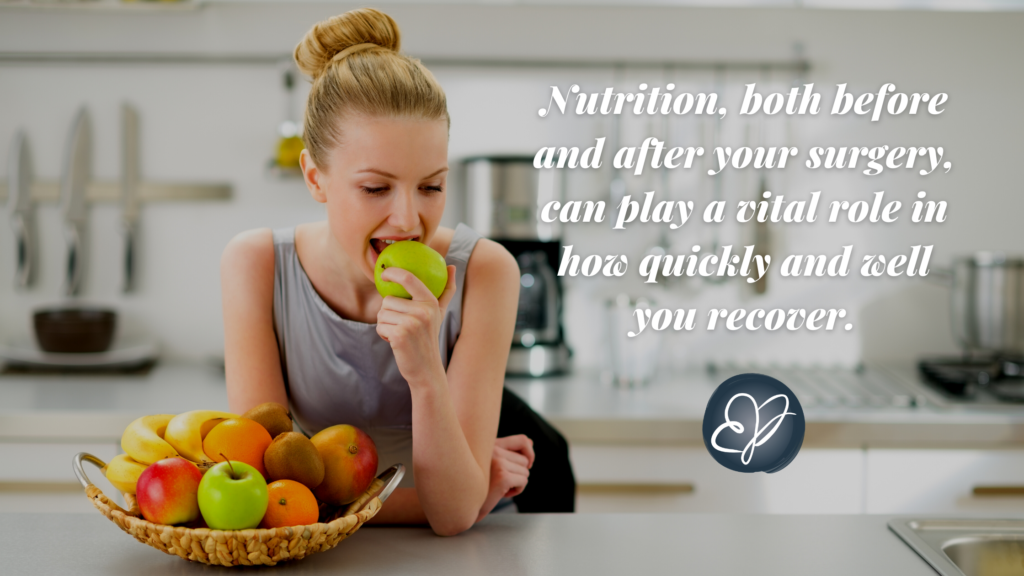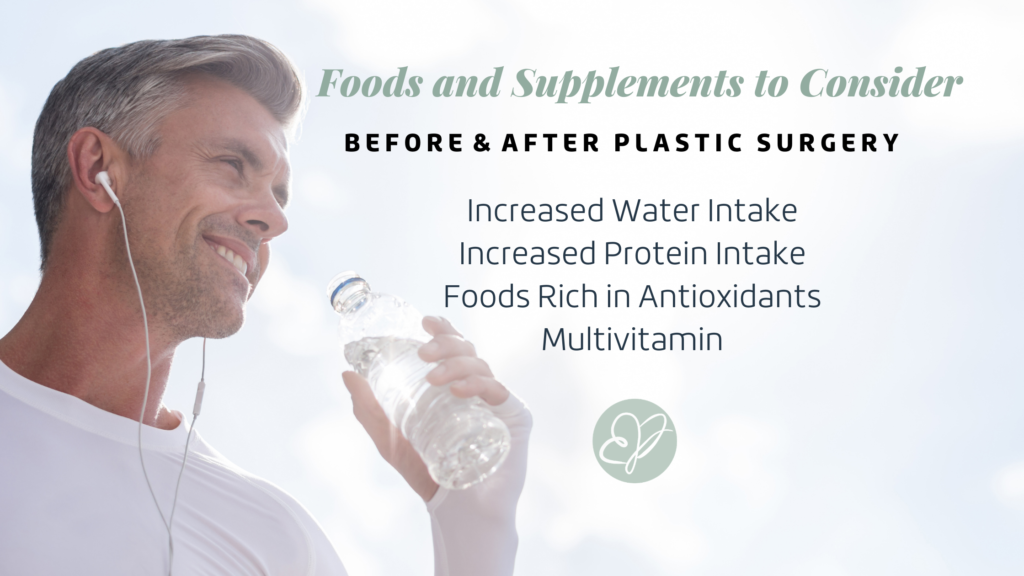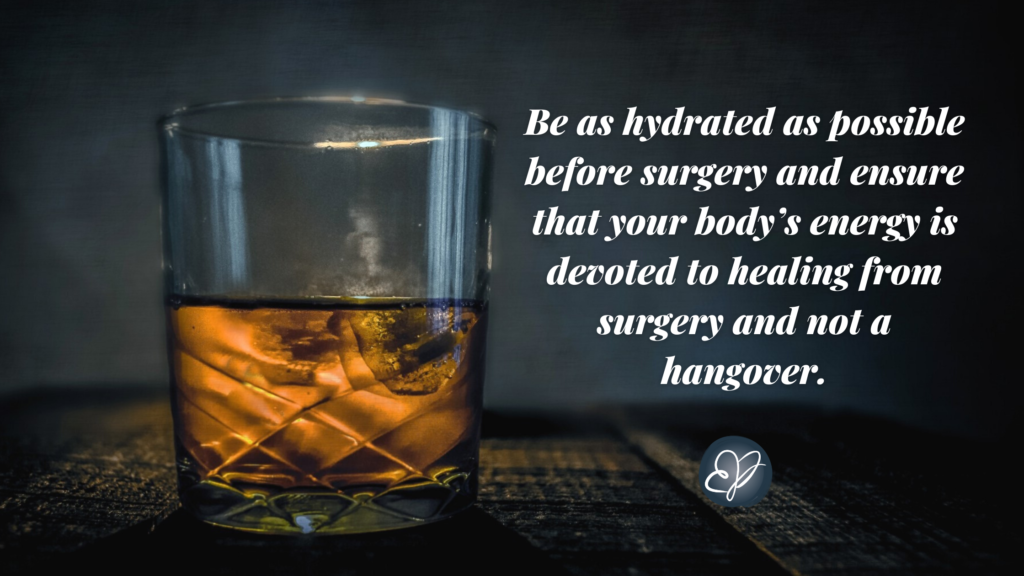Just like any surgery, Plastic Surgery can put a significant amount of stress on your body, especially if multiple procedures are performed during a single operation. In addition, the healing and recovery process requires a tremendous amount of energy from our bodies. Nutrition, both before and after your surgery, can play a vital role in how quickly and well you recover. From reducing your risk of infection to possibly lessening the appearance of scarring, the role nutrition plays in healing from Plastic Surgery should not be overlooked.

Why Does My Surgeon Want Me at a Stable Weight before Surgery?
Healing from a surgical procedure takes energy – LOTS of energy. For our bodies, this energy comes in the form of calories from the foods we consume. Therefore, your surgeon will NOT want you to be on a calorie restrictive diet after surgery because your body will need energy to heal. You will be encouraged to be at stable body weight before surgery to allow for increased caloric consumption during your recovery. Patients should take in at least 1,500 calories a day with a balanced diet before surgery. After surgery, your body will need at least 2,500 calories per day (15-20 calories per pound of body weight) to sustain the energy needed for recovery. Because many patients temporarily lose their appetite after surgery, it’s a smart idea to have balanced, nutrient-dense meals prepared ahead of time that you can easily prepare for yourself when you return home.
Foods and Supplements to Consider Before & After Plastic Surgery
For optimal healing, your body will require more nutrients, vitamins, and minerals both before and after your surgery. Therefore, it’s important to discuss any dietary restrictions or specialized diet you may be following with your Plastic Surgeon before your surgery. In addition, some diets may deplete you of certain key nutrients essential for proper healing, which will need to be discussed with your surgeon. Consider adding the following to your diet before and after your surgery for expedited healing and recovery:
Water – Drinking plenty of water is always beneficial to your health, especially when your body is healing from Plastic Surgery. Adequate water intake ensures that your body’s lymphatic system can effectively flush out waste products that are a byproduct of tissue healing. In addition, skin that is hydrated and healthy before surgery is better equipped to heal wounds along incision and suture sites, resulting in less noticeable scarring. Set a goal of drinking at least half of your body weight in ounces of water the weeks leading up to your surgery and during your recovery.

Protein – Protein is an essential building block of the human body, so it makes sense that it plays a crucial role in how our body heals from surgery. Both collagen and blood cell production rely heavily on protein to help them heal tissues and transport nutrients throughout the body. Consider incorporating healthy, lean proteins like organic meats, free-range eggs, nuts, seeds, and fish into your diet before after surgery to ensure your body has the protein it needs for a speedy recovery.
Vitamins A & C – Surgery causes inflammation. Inflammation causes free radical damage in return. As a result, free radicals can cause further tissue damage and even prolong the healing process. Therefore, it is beneficial to consume a diet rich in antioxidants before and after Plastic Surgery to combat the effects of free radicals. Fuel your diets with fruits and vegetables laden with Vitamins A and C, such as sweet potatoes, spinach, broccoli, and carrots. Make sure you are taking a daily multivitamin to supplement anything your body may not be getting naturally through your diet at this time as well.
Zinc & Iron – Zinc is beneficial to the body both before and after surgery due to its ability to help prevent infection. Iron helps build red blood cells, which helps to increase oxygen delivery to tissues that are healing after surgery.
Foods to Avoid One Week Before Plastic Surgery
Your Plastic Surgeon may recommend that you avoid certain foods, supplements, and beverages the week before your surgery due to their ability to influence blood clotting and other factors. In addition, you must communicate to your surgeon all medications and supplements you are regularly taking at this time. Common omissions that your surgeon may require a week before surgery include:
Omega 3 – The Omega family has been shown to thin blood and increase bleeding, factors that can impact your surgery.
Vitamins E, D, K, B, A & D – This family of vitamins can interfere with anesthesia.
Herbal Supplements – Your surgeon will want a detailed list of all herbal supplements you regularly consume to ensure that none can cause complications, such as blood-thinning, before your surgery. Make sure you have a list prepared to discuss with your surgeon, including your multivitamin. Common anti-coagulant offenders include ginger, green tea, cayenne, nightshade veggies, and ginkgo.
Anticipate that it is common for surgeons to request that you stop the use of all supplements prior to surgery. Most supplements are not regulated by the FDA, and unknown additives can cause bleeding complications, or kidney or liver malfunction which can influence how patients process anesthetic drugs or post- operative prescriptions.

Alcohol – Alcohol can not only thin the blood, but it can also be very dehydrating to your system. Therefore, you will want to be as hydrated as possible before surgery and ensure that your body’s energy is devoted to healing from surgery and not a hangover.
Caffeine – Caffeine elevates your resting heart rate and can increase bleeding and sensitivity. Therefore, your surgeon will most likely have you abstain from caffeine for at least one to two days before your surgery.
Foods to Avoid After Your Plastic Surgery
As your body enters the recovery stage after your Plastic Surgery, you’ll want it primed for healing. This interval of time is when you’ll want to ensure that the energy your body takes in from food is devoted to rebuilding healthy tissues, decreasing inflammation, boosting your immune system, and flushing your body of cellular waste. To achieve this, consider abstaining from these foods after surgery:
Sugar – Refined sugar is worth cutting from your diet regardless of if you are healing from surgery or not! Sugar has been tied to increased inflammation in the body and even suppressing the immune system.
Salt – Hydration is critical for healing. Excessive sodium consumption can cause fluid retention and prolong any swelling or puffiness you may have after surgery.
Alcohol – Like salt, alcohol can also cause fluid retention and prolonged swelling after surgery, but more importantly, it may have negative, even dangerous interactions with some of the pain medications you may be prescribed after surgery.
Your body will demand additional vitamins, minerals, and nutrients after Plastic Surgery to ensure you have the energy required for healing and to help reduce swelling, ward off infection, resolve pain, and even keep your spirits up! Never underestimate the healing power of food. Set yourself up for success by following these recommendations and discussing diet and nutrition with your Plastic Surgeon before your procedure. Strive to keep the healthy habits you adopt before and after your surgery to ensure that your results maintain their longevity and your overall health is enhanced for years to come!
Schedule a complimentary in-person consultation with a Board-Certified Edina Plastic Surgery Surgeon by calling (612) 688-3177 or simply CLICK HERE to get started.


